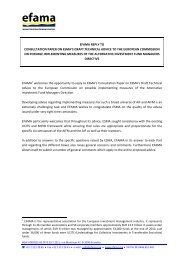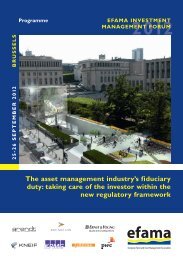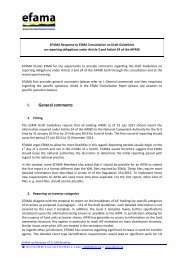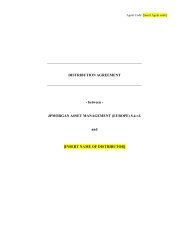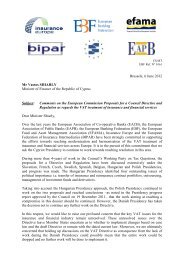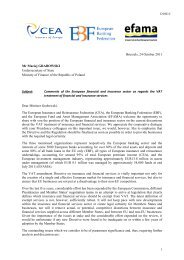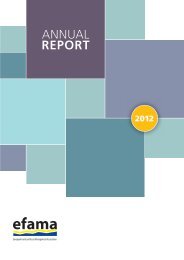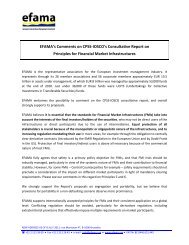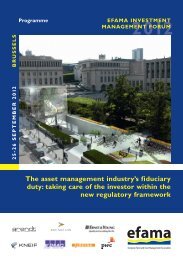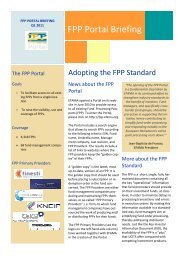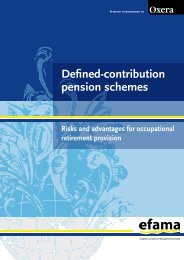EFAMA KPMG Solvency II Report
EFAMA KPMG Solvency II Report
EFAMA KPMG Solvency II Report
You also want an ePaper? Increase the reach of your titles
YUMPU automatically turns print PDFs into web optimized ePapers that Google loves.
4 WORKING GROUP FINDINGS | 47<br />
Insurers will be concerned about the risk they are carrying on balance sheet and<br />
there is likely to be a reduction in the level of discretion afforded to asset managers.<br />
Mandates may well become more granular and prescriptive; for example, the asset<br />
manager’s ability to generate additional return by including off-benchmark assets may<br />
be restricted. Alternatively, mandates may delegate asset management decisions to<br />
be taken not in a traditional risk / return framework but in a way that is sensitive to the<br />
economic capital implications of the decisions as they are made.<br />
Asset managers should consider whether they need to deploy specialist teams<br />
focused on the needs of the insurers. As well as understanding the <strong>Solvency</strong> <strong>II</strong><br />
regulations, asset management decisions will be constrained by local accounting and<br />
tax issues, rating agency considerations and other factors. Some fund managers will<br />
simply not be equipped to manage asset portfolios when faced with such a complex<br />
array of constraints to be managed simultaneously.<br />
The use of specialist teams will also facilitate closer working relationships between<br />
insurers and asset managers, so that decisions are made based on increased<br />
communication and transparency and taking into account the best possible perspective<br />
on investment opportunities. In an ideal situation, asset managers will be able to assess<br />
for themselves the impact of possible decisions on the insurer’s capital requirements,<br />
and will have a good understanding of the insurer’s risk management framework.<br />
It would be sub-optimal for insurers to maintain these relationships with several asset<br />
managers; it is far more likely that they will wish to select one or two asset managers<br />
to act as strategic partners. These asset managers must be willing to invest time in<br />
developing advisory capability, more sophisticated portfolio construction and risk<br />
management tools, and customised reporting facilities.<br />
Handled well, these changes will lead to longer-term relationships between insurers<br />
and their asset managers; performance may no longer be assessed on rolling 3 year<br />
performance relative to a standard benchmark but instead take into account the full<br />
range of services provided.<br />
Smaller insurers are likely to simplify the range of investment strategies they<br />
employ, because there is no benefit in employing strategies that are outside the<br />
insurer’s risk assessment capabilities. They may look to outsource their entire asset<br />
management requirements.<br />
Larger insurers are more likely to find that there are returns on investment in more<br />
sophisticated strategies, for example those that rely on the pursuit of diversifi cation<br />
benefits, those that impose a greater investment governance burden, or those that<br />
are more dynamic in nature.<br />
Insurers both small and large may consider the use of third party administrators or<br />
platforms to simplify accounting and record-keeping, recognising the greater burden<br />
of data governance and the need for more rapid and complete reporting.<br />
© 2012 <strong>KPMG</strong> LLP, a UK limited liability partnership, is a subsidiary of <strong>KPMG</strong> Europe LLP and a member fi rm of the <strong>KPMG</strong> network of independent member fi rms affi liated with <strong>KPMG</strong> International<br />
Cooperative, a Swiss entity. All rights reserved.



